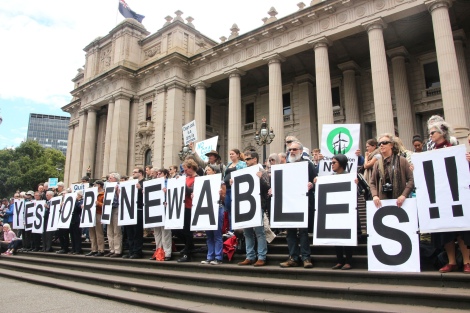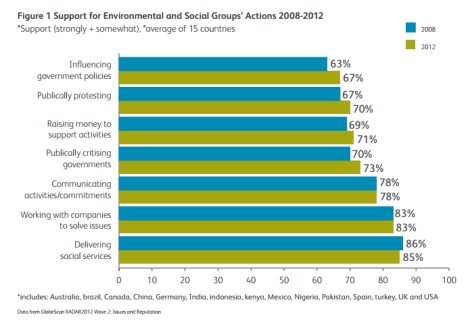
The advocacy of environmental not-for-profit organisations in Australia under threat. Image by Takver via Flickr
It brings me no pleasure to focus yet another blog on a government using regressive measures to undermine the independent voice of campaigning not-for-profit organisations. A chill wind is blowing through global civil society as governments around the world take a collective backward step in their rhetoric towards not-for-profit advocacy. As with many nations, the battle front in the confrontation between the state and civil society in Australia is taking place in the politically fraught arena of environmental advocacy.
The recent push-back from governments against critical voices in the not-for-profit sector sits in the wider, and deeply worrying context of a global crackdown on not-for-profit advocacy generally. The most recent Future World Giving publication, “Enabling an Independent Not-for-profit Sector” focuses on this issue and other blogs on this website have investigated the debates at the heart of this trend. In many net-beneficiary countries the pattern is for governments try to limit the flow of foreign funds to advocacy organisations, with UN Special Rapporteur on the rights to freedom of peaceful assembly and association Maina Kiai highlighting “increased control and undue restrictions” on funding, particularly foreign funding as one of two key issues (the other being freedom of assembly) as currently being “the most significant ones of his mandate”. In other countries, such as Egypt, Indonesia and Azerbaijan to name but a few, the trend has been for a less subtle approach with legislators electing to amend the law and use the apparatus of the state to make advocacy effectively impossible, or in the case of the UK Lobbying Bill, less straightforward.
But the trend for governments to focus on environmental not-for-profits seems to represent a distinct subset of this more general crackdown on civil society independence. Having recently written about increasingly hostile government actions against environmental groups in India and Canada, I am compelled to continue this grim tale with a brief account of the recent experiences of Australian environmental organisations.
In June, 2014 Federal member for Bass, (Tasmania) Andrew Nikolic tabled a motion at the Liberal Party Federal Council, for the charitable status of environmental organisations – which in Australia is required to receive tax deductable donations – to be stripped. In doing so he stated that such groups were engaging in activities which were “engaging in the sort of activism that is at odds with Tasmania’s future prosperity”. That followed statements from the parliamentary secretary for agriculture, Richard Colbeck in relation to a backbench review of competition laws that “quite a number in the ministry” saw the review as an opportunity to remove an exemption for environmental groups from the consumer law ban on so-called “secondary boycotts” adding that “there is an appetite in the government for changing these laws”. In addition, Coalition MP George Christensen has called for a “cleansing” of the Department of Environment’s list of those organisations eligible to receive tax-deductible gifts.
It seems that such economic justifications lie at the heart of the desire within some governments to limit the voice of environmental advocacy groups. In 2012 Joe Oliver, then the Canadian Minister of Natural Resources made this motivation abundantly clear in stating that; “Unfortunately, there are environmental and other radical groups that would seek to block this opportunity to diversify our trade. Their goal is to stop any major project no matter what the cost to Canadian families in lost jobs and economic growth.” Since then the Canada Revenue Agency has engaged in a number of audits of environmental organisations that are felt by the sector to be politically motivated.
In India, media reports in early June claimed to have obtained a leaked document from the Intelligence Bureau titled, “Concerted efforts by select foreign-funded NGOs to take down Indian development projects’ which allegedly attempted to quantify the economic cost of failed projects due to the campaigning work of human rights and environmental organisations. The Intelligence Bureau report followed comments by the former Union Minister and senior Congress leader M Veerappa Moily who said that the government should “seriously look into” whether any not-for-profit organization was using the funds it receives from abroad to disrupt economic growth or destabilize the nation. In late June it was reported that the Ministry of Home Affairs (MHA) had told the Reserve Bank of India (RBI) to instruct banks to gain clearance from the Home Ministry’s Foreign Contribution Regulation Act (FCRA) Department before allowing money to reach Greenpeace India from its principle international funders.
Environmental issues are politically consensus. The polarisation of opinion on the subject makes environmental not-for-profit organisations a ripe target for those who believe that environmental concerns are overstated or that economic concerns must take precedence. Whether or not we agree with that point of view we must respect the right of those who hold it to express their opinions. By the same token, those who disagree with the views of environmentalists – even those in government – must respect the right of such views to build support and exert an influence through legal means within civil society. The foundations of a representative democracy are built on the notion that the minority are able to raise awareness of the strength of their views amongst the majority.
Indeed, it seems that around the world, citizens appreciate the notion that not-for-profit advocacy is a healthy part of a vibrant civil society that provides checks and balances to power. Indeed, according to research by Globescan, across 16 countries at differing levels of economic development, 73% of people surveyed in 2012 supported criticism of governments and companies by “social and environmental groups” and 67% supported their efforts to influence government policy. Indeed, support has actually increased since 2008 by 3 and 5 percentage points respectively.
When environmental not-for-profits engage in activities which are illegal they should be held to account for their actions. But to change the law to deny status and the right to speak out to environmental groups, rather than attempt to win a fair argument, is underhanded at best, and cowardly and undemocratic at worst.
Adam Pickering


Pingback: Hungary’s Crackdown on NGOs—Part of Global Trend | Future World Giving·
You need to take part in a contest for one of the finest websites on the net.
I’m going to recommend this blog!
LikeLike